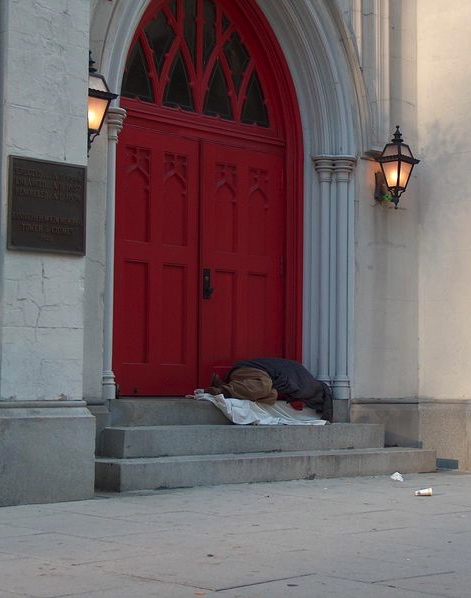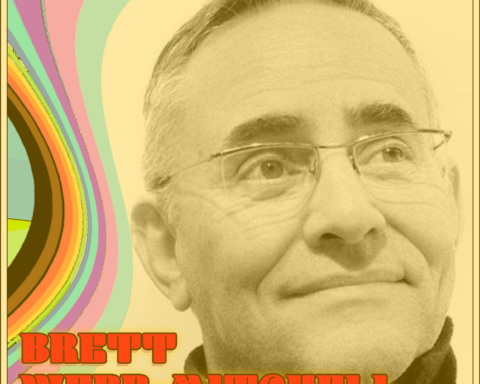The Unity of the Gospel and our Common Need for God’s Compassion

Urban ministry is often typified by a focus on those who live in depressed socioeconomic conditions. This type of ministry is almost always associated with conditions of poverty and Jesus’ preferential option for the poor. In reality, however, cities are a mixture of ‘haves’ and ‘have-nots.’ This is increasingly the case in gentrifying areas. For example, in the past ten years the Northern Liberties-Fishtown-Kensington area of Philadelphia has seen a rapid influx of young, college-educated adults move in alongside the working-class families that have been there for over a century. This creates a unique opportunity for the church to foster community that transcends socioeconomic divides.
The different priorities of ‘haves’ and ‘have-nots,’ however, present a challenge to such an effort for unity. Ministers and laypeople alike must consider whether the church does and can provide common ground on which people from different walks of life might meet. This article will argue that, although ‘haves’ and ‘have-nots’ are groups with different priorities, both are equally in need of God’s compassionate mercy and grace. ‘Haves,’ however, must divest themselves of the illusion that they are not in need. It is in that state of need, then, that both groups are able to love God and receive God’s compassion.
___________________________________________
Urban ministry is often typified by a focus on those who live in depressed socioeconomic conditions. In reality, however, cities are a mixture of ‘haves’ and ‘have-nots.’
___________________________________________
Generally speaking, the priorities and needs of ‘have-nots’ are determined largely by their lack of the resources necessary to maintain an adequate standard of living and exercise control over the circumstances of their lives. The less that people have – including not only liquid resources but also the means to access other necessary resources, such as healthcare – the more they are exposed to forces that threaten their existence. In this situation, many are caught in the painful tension of, one the one hand, having a greater awareness of their vulnerability, but on the other hand, not having the means to protect that vulnerability. Even if someone has what they need to make it to the end of the day, month, or year, they do not have a guarantee that they will be able to make it beyond that.

The priorities and needs of ‘haves,’ on the other hand, tend to be predicated on the availability of – or their ability to access – the resources that enable them both to live comfortably and to exercise agency in how they live. Although the ‘haves’ do not lack the vulnerability that is common to all human beings, they can buffer that vulnerability with control over their circumstances. Not only are they able to resist the vagaries of fate that condition their lives, but they can also make more choices about where and how they will live. They are able to acquire more resources and to use those resources in ways that they desire.
Ministry among ‘have-nots’ and ‘haves’ naturally reflects those different priorities and needs. For the former, the focus tends toward providing necessary resources, giving encouragement to persevere through trials, and offering the comfort of a God who is present in the midst of distress. Even when the church is not able to provide physical security, it can provide the existential security that people need to be able to endure suffering.
___________________________________________
How does one speak about stewardship and the call to care for creation when people do not have money or the means of exercising ethical choices on such scale? How does one speak about God’s healing presence to people who do not know that they are in need of healing?
___________________________________________
‘Haves,’ as we have seen, are able to secure those things for themselves. Ministry focuses instead on directing the usage of those resources, addressing moral and ethical concerns, and providing opportunities for consumption – e.g. workshops, classes, and book studies – that often require resources such as money, time, and education.

As long as ‘haves’ and ‘have-nots’ live in different areas and attend different churches, the differences in priorities is not a problem. A church, however, that wants to be available to all people will no doubt struggle with the incompatibility of these two different forms of ministry. How does one speak about stewardship and the call to care for creation when people do not have money or the means of exercising ethical choices on such scale? How does one speak about God’s healing presence to people who do not know that they are in need of healing?
This is not the first time the church has faced the challenge of finding unity between people from different socioeconomic classes. James’ epistle to the “twelve tribes in the dispersion” dealt with similar concerns. Apparently believers of high social status were considering their social positions to be signs of worthiness and were extending status division into the worship assembly, undermining their essential unity in Christ. Meanwhile, they were abusing their power by extorting the poor and giving unjust wages for labor.
___________________________________________
James’ message was, in short, that these ‘haves’ do not really have.
___________________________________________
James’ message was, in short, that these ‘haves’ do not really have. The things they considered to be of value – wealth, status and power – were in fact of no value at all. He makes two arguments to support this claim. First, and most importantly, he reminds them that the contingency of our existence rounds the worth of all earthly things down to zero. “For the sun rises with its scorching heat and withers the grass; its flowers fall, and its beauty perishes. So also will the rich fade away in the midst of their pursuits.” James disabuses the ‘haves’ of the notion that they have the agency to secure for themselves eternal good. Furthermore, James tells the ‘haves’ that they are in a state of moral lack. Their behavior demonstrates the fact that they are unable to desire that which is good. Rather, they have desired things that lead to decay. Just as gold and silver corrode, so also is the heart that desires those things corrodes. Not only are they not able to secure for themselves eternal life; they do not even have the ability to direct their desires toward good ends.
 Lest one think that James’ words can be dismissed as addressing a ‘local’ problem, consider how he echoes Jesus’ prioritization of the ‘have-nots’ during his earthly ministry. Like James after him, Jesus claimed that, despite appearances, it is the ‘have-nots’ who have an advantage over the ‘haves’ in terms of access to the kingdom of God. The ‘have-nots,’ in their need, are in a position to receive God’s mercy with gratitude whereas the ‘haves,’ who have stored up treasures on earth, have “received their reward” already.
Lest one think that James’ words can be dismissed as addressing a ‘local’ problem, consider how he echoes Jesus’ prioritization of the ‘have-nots’ during his earthly ministry. Like James after him, Jesus claimed that, despite appearances, it is the ‘have-nots’ who have an advantage over the ‘haves’ in terms of access to the kingdom of God. The ‘have-nots,’ in their need, are in a position to receive God’s mercy with gratitude whereas the ‘haves,’ who have stored up treasures on earth, have “received their reward” already.
What is the basis of this advantage? Perhaps a clue can be found in Plato’s discussion of love in the Symposium. Plato argues, through the mouth of Diotima, that need is intrinsic to love. If a person has the thing they desire, then they no longer desire it. It is the felt absence of the good that stirs a desire for the good. Love is predicated on the fact that the person does not possess the beloved.[2]
___________________________________________
‘Haves’ and ‘have-nots’ are not two separate groups of people in need of two separate gospels. They simply occupy two different stages of spiritual growth as we all move toward the fullness of love which is found in God’s compassion and grace.
___________________________________________
There are two problems, however, that make it difficult for us to enjoy the eternal goodness which alone is properly called good. The first is that God, in God’s fullness, cannot be possessed by any mortal being. The second is that we seek to satiate our desire for God in created things. In view of these problems, Jesus praised those who acknowledged their need, because need is a necessary condition for sharing in the divine life through love. ‘Haves,’ who have the means to satisfy their desires with earthly things do just that and thus are rarely in a position where they might experience that longing for the good that the ‘have nots’ know so well. They are, Plato would say, incapable of love. Only after they detach themselves from their love of earthly things will they be available to enter into communion with God.
 I should remark at this point that need is a necessary but not sufficient condition for love. It is entirely possible for need to lead to something other than love for the divine. Need can easily manifest itself as resentment, fatigue, anger, or depression. In the parable of the servant who had the larger debt forgiven, Jesus teaches that it is God’s compassionate mercy and grace that fills up our lack and calls forth love from us. Although mortal beings cannot possess the eternal good in the way that we can possess earthly things, we can be given the good through God’s compassionate response to our frailty.
I should remark at this point that need is a necessary but not sufficient condition for love. It is entirely possible for need to lead to something other than love for the divine. Need can easily manifest itself as resentment, fatigue, anger, or depression. In the parable of the servant who had the larger debt forgiven, Jesus teaches that it is God’s compassionate mercy and grace that fills up our lack and calls forth love from us. Although mortal beings cannot possess the eternal good in the way that we can possess earthly things, we can be given the good through God’s compassionate response to our frailty.
‘Haves’ and ‘have-nots’ are not two separate groups of people in need of two separate gospels. They simply occupy two different stages of spiritual growth as we all move toward the fullness of love which is found in God’s compassion and grace. All of us are human, and so all of us stand in need of the eternal life that is found in God. In order to receive this life, all of us, ‘haves’ especially, must humble ourselves and detach ourselves from the proximal goods on which we have spent our desires, so that we might be in a position where we can receive God’s grace. We must all allow our need to reach out to the God who alone fills our need. This does not change the objective circumstances in which we find ourselves: those who have not still need food, shelter, and clothes. Those who have still need to consider how they might live responsibly in the world. Both, however, share in the same need and in the same divine compassion, poured out on behalf of all people.
[1] Plato. Symposium, trans. Benjamin Jowett, (New York: Penguin Books, 1999).
*****
AUTHOR BIO: Jordan Burdge is a 2009 graduate of Princeton Theological Seminary, and is currently completing graduate studies in personality psychology at West Chester University of Pennsylvania. He lives in the Kensington neighborhood of Philadelphia where he is involved in the Beacon church community.
To read other articles from Week 2: The Sin of your Sister Sodom, click here.
Read more articles in this series.





Unbound Social